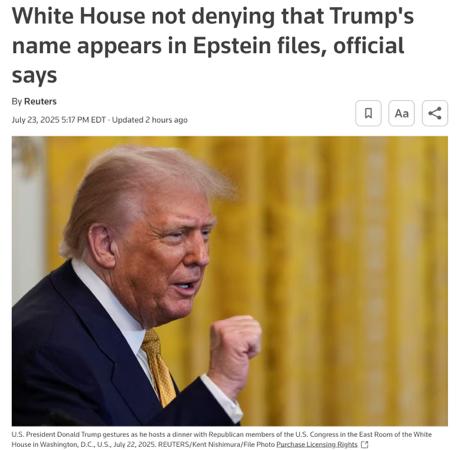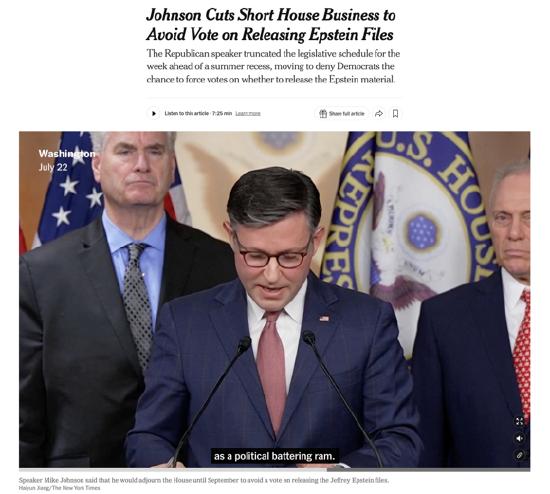

On July 23rd, local time, the political landscape in the United States was once again shaken by the aftershocks of the Epstein case: On one hand, President Trump’s name was repeatedly revealed in the latest public court documents; on the other hand, the House of Representatives abruptly entered into a recess for August, sparking widespread doubts about the transparency process of the “client list” being politically obstructed.
Despite Speaker Johnson insisting that this arrangement is “normal agenda,” mainstream media have disclosed that the bipartisan “public client list” bill, which should have been advanced this week, has now been put on hold by the Rules Committee. The Democratic Party has accused the Republican party of deliberately delaying the process to avoid the political risks associated with the exposure of the list.
The concentrated outbreak indicates that the Epstein case is transitioning from a “judicial old case” to a “political storm,” and may become an intense power and moral confrontation that the US Congress must face after the resumption of session in autumn.
According to reports by The Wall Street Journal, the Department of Justice informed Trump that his name is on the “Epstein” file.
“Trump’s Name Frequent” Stirs Up More Controversy
According to several mainstream American media outlets, a new batch of federal court documents released on July 23rd revealed that Trump’s name appeared multiple times in Epstein’s private flight list, schedule records, and some witness statements. Although these materials were mostly recorded early on, their concentrated release following this compilation still left Trump’s camp vulnerable to public opinion defense.
As reported by American media, Trump’s team claimed that the related contacts were purely social activities and had nothing to do with the core of the case, emphasizing that Trump had “cut off all contact with Epstein years ago.”
However, against the backdrop of accelerating midterm elections, public sentiment is extremely sensitive to such issues, especially regarding perceptions of “relationships with powerful figures,” which can easily lead to moral blowback.
Trump’s “appearance in the archives” did not constitute judicial responsibility, but it posed a substantial challenge to his image management and intra-party reputation. This was particularly evident when Democrats intended to use the “Transparency List” as a rhetorical tool.
According to a report by Reuters, a government official stated that the White House had not denied the presence of President Trump’s name in related documents pertaining to Epstein’s case.
The focus shifted to procedural deadlocks within Congress. On the afternoon of July 23rd, the House of Representatives suddenly announced an early summer recess one day ahead of schedule. However, this move, which typically occurs on Thursday or Friday of last week of July, immediately raised questions about the motive behind the “voting avoidance.”
A bill aimed at promoting the public release of the “Epstein client list” had initially received support from some Republican members, seen as having cross-party cooperation prospects. Yet, it was ultimately shelved by the Republican-led rule committee, effectively blocking its potential for floor votes.
This move has sparked strong dissatisfaction among Democrats. Several lawmakers accused Republican officials of “deliberately avoiding political commitments to transparency and accountability,” hinting that some Republicans were worried that the list’s disclosure might implicate extensive business and political networks, thereby triggering uncontrollable political impacts.
Meanwhile, Speaker of the House Mike Johnson, facing media inquiries, stated that the recess was a “normal agenda planning” and denied any “pressure on the committee.” However, several liberal and some conservative members expressed dissatisfaction with this explanation.
△ The Guardian reported that Trump’s name has been frequently listed in the Department of Justice records, but the department pointed out that a large amount of unverified information is contained therein, insufficient to initiate further investigation.
The “Customer List” controversy escalates.
Although the House of Representatives has entered recess, the Democratic side has made it clear that they will launch a “mandatory vote motion” after the resumption of session in September, aiming to bypass the procedural obstacles of the rule-making committee and directly push the bill through full floor votes.
This non-traditional procedure must be signed off by at least 218 members of Congress for it to take effect, which is extremely rare within the American Congressional system. This means that if the Democratic Party can secure some support from moderate Republican lawmakers, the bill still has a chance to enter floor votes.
More crucially, once this procedure is implemented, it not only shakes the convention authority of the Speaker of the House to control agendas but also could trigger a division within the Republican Party over “moral transparency” versus “political risk,” presenting a real test of the current Speaker’s leadership.
△ The New York Times reports that the House of Representatives has moved into recess early, reflecting the severe internal disagreements within the Republican Party on this matter that have rendered the House paralyzed.
The path towards “re-politicization” of the Epstein case is clearly visible.
As new documents about the case are continuously revealed, the symbol “Epstein” is rapidly moving away from its original legal category, becoming a multidimensional political symbol. It represents public anger towards “privileged immunity” and relates to cross-party, cross-class “moral inquiry”; it is also directly embedded into value narratives related to the election campaign, serving as a barometer for institutional transparency and power oversight.
The inclusion of Trump’s name in the list is an important signal in this “re-politicization” path. Meanwhile, the obstruction of congressional procedures and public backlash reflect that the issue has transcended the boundaries of law and turned towards challenging the mechanisms of power operation itself.
It is foreseeable that with the resumption of Congress in September, the “Customer List Publication Act” will become a focal point of public opinion in the House of Representatives and is likely to trigger a rare procedural conflict.
This is not merely about a list of names; it is a comprehensive clash over public access rights, institutional fairness, and party interests.
Against the backdrop of an impending midterm election and deepening concerns among the public about elitist politics,
the Epstein case is very likely to shift from being a “historical scandal” to becoming a “structural issue,” becoming one of the key variables that will shake Washington’s balance in the coming months.